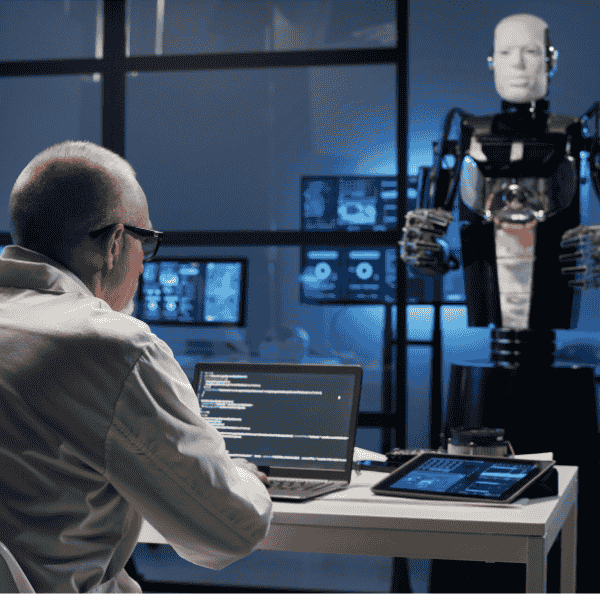Understanding the Basics
What is Applied Artificial Intelligence?
The goal of the interdisciplinary discipline of applied artificial intelligence (Applied AI) is to apply AI technologies to address challenges in the real world. In contrast to theoretical AI research, which only considers AI ideas in an academic setting, applied AI uses these ideas in real-world applications. Consider it the use of AI to develop solutions that assist diverse industries and handle particular problems.
What is Machine Learning?
A branch of artificial intelligence (AI) called machine learning (ML) focuses on creating algorithms and statistical models that let computers get better at a particular task by learning from data. In other terms, machine learning (ML) is the study of teaching computers to acquire knowledge and make inferences or judgments without being explicitly programmed. Applications like recommendation systems, picture recognition, and natural language processing are all driven by it.
Curriculum Comparison
Let’s take a closer look at the course offerings for these two Master’s degrees so you can have a better idea of what you’ll be learning.
MS in Applied Artificial Intelligence Curriculum
In an MS in Applied AI program, you can expect to study a wide range of topics, including:
Advanced Machine Learning: Understanding the underlying workings of machine learning algorithms and models will take up most of your time.
Computer Vision: This topic focuses on making it possible for machines to decipher and comprehend visual data, such as pictures and movies.
Natural Language Processing (NLP): A key skill for applications like chatbots and language translation, you’ll learn how to analyze and produce human language.
Robotics: The development of autonomous systems, such as drones and self-driving cars, is explored under the robotics section.
Ethics in AI: The moral and ethical ramifications of AI applications are examined in this aspect, which is becoming a more crucial factor in the industry.
Your practical skills for developing AI solutions that may be implemented in a variety of industries will be provided through the program. It is practical and oriented toward resolving issues in the actual world.
MS in Machine Learning Curriculum
In contrast, the theoretical parts of ML are given more weight in MS in Machine Learning programs. Typically, the curriculum includes:
Statistical Learning: You will study how algorithms function mathematically as you delve deeply into the mathematical underpinnings of machine learning.
Data Mining: This subject focuses on gleaning important patterns and insights from huge datasets.
Reinforcement Learning: You’ll examine the idea of algorithm training through error, which is crucial for applications like AI that play video games.
Deep Learning: The focus of this field of study is neural networks and the applications they have, such as voice and picture recognition.
Big Data Analytics: Being able to manage and analyze large datasets is essential in today’s data-driven society.
Here, the emphasis is on gaining a thorough understanding of the theoretical and mathematical foundations of the algorithms and models that underlie machine learning.
Career Prospects in Applied AI
Industries and Opportunities
Although there are interesting employment options in both subjects, they frequently lead to distinct sectors and occupations. Specialists in applied AI are well-suited for jobs in fields where AI is utilized to tackle challenging real-world issues, like healthcare, finance, and autonomous cars. Contrarily, machine learning has a wider range of uses, including fraud detection in the banking industry and recommendation systems in e-commerce.
Salary Expectations
Both disciplines can offer rich wages, but Applied AI experts frequently fetch more pay because of their proficiency in solving problems unique to particular industries. But it’s important to remember that wages might vary widely depending on your area, your level of expertise, and the particular work type.
Machine Learning’s Appeal
Versatility of Machine Learning
The adaptability that an MS in machine learning program gives is one of its main benefits. Your ability to apply your newfound talents to a variety of businesses will put you in demand as a professional in today’s data-driven society. Expertise in machine learning is highly sought after in a variety of industries, including banking, healthcare, marketing, and more.
Industry Demand
As more sectors realize the potential of data-driven decision-making, there is an increasing demand for machine learning specialists. Machine learning is essential for resolving complicated issues and boosting productivity, whether it’s optimizing supply chains, personalizing user experiences, or forecasting disease outbreaks.
AI Specialization in Master’s Program
Benefits of Focusing on AI
In your Master’s program, selecting an AI specialization might help you gain a deeper comprehension of AI applications. You can become an expert in your chosen profession by using this specialization to explore further fields like computer vision, natural language processing, and robotics. A focus on AI can lead to opportunities in particular professions that demand highly developed AI abilities.
Potential Drawbacks
It’s important to keep in mind, too, that specializing in AI may restrict your employment possibilities to some extent. You might need to pick up new abilities or go through further training if you subsequently decide to change your focus to another area of AI or machine learning.
Choosing Between AI and Machine Learning
Your Interests and Goals
You should take your hobbies and professional objectives into account when deciding whether to pursue an MS in Applied AI or Machine Learning. Consider whether your passion lies in applying AI to solve practical issues, or whether your interests lie more in the theoretical and mathematical underpinnings of machine learning. Your area of study should be consistent with your particular interests.
Future Industry Trends
It’s a good idea to monitor market developments as well. The need for experts in AI and machine learning is projected to stay high as both sectors are expanding quickly. You may match your education to new prospects and maintain your competitiveness in the job market by remaining up-to-date on industry trends.
AI and Machine Learning Degrees
Reputation and Accreditation
It’s important to check the institution’s reputation and accreditation before enrolling in any Master’s program. A degree from a reputable university might provide access to improved networking possibilities and professional chances. Seek out programs with a proven track record of producing graduates who excel in their chosen fields.
Research Opportunities
Think about if you want to pursue research in addition to your Master’s. Some programs give you the chance to work on research projects, which can be a useful experience if you want to go into academia or advance your field. You can develop a solid portfolio and obtain real-world experience through research.
Job Opportunities with MS in AI
Job Roles and Responsibilities
With a Master’s in Applied AI, you’ll have a wide range of job roles to choose from, including:
AI Engineer: Responsible for building and implementing AI solutions.
Data Scientist: Analyzing data to drive decision-making and solve complex problems.
Machine Learning Engineer: Developing and deploying machine learning models and algorithms.
AI Research Scientist: Conducting research to advance the field of AI.
Your daily responsibilities will vary depending on your chosen career path, but all of these roles involve using AI to solve real-world challenges.
Skill Requirements
You’ll need a variety of technical abilities to succeed in these positions, including proficiency in programming languages like Python, knowledge of machine learning frameworks (such as TensorFlow, and PyTorch), and a solid background in math and statistics. In the realm of artificial intelligence, soft skills like problem-solving, communication, and creativity are equally crucial because you’ll frequently work with interdisciplinary teams and must successfully convey complicated concepts.
The Career Journey
The Initial Steps
Selecting the best Master’s program that fits your interests and aspirations is the first step on your path to a prosperous career in AI or machine learning. Once you’ve picked your choice, go into the coursework, take on internships or projects, and develop a solid body of work that demonstrates your knowledge and abilities.
Career Progression
Your employment opportunities will increase as you develop your knowledge and skills in the subject. You might begin as a junior data scientist or AI engineer and progressively advance to more senior jobs. To go even further into research and academics, some people decide to seek a Ph.D. in artificial intelligence (AI) or machine learning. Others make use of their abilities to start businesses or make contributions to market developments.
Conclusion: Finding Your Path
There is no definite conclusion to the ongoing argument between an MS in Applied Artificial Intelligence and an MS in Machine Learning as to which is “better.” The best option for you will depend on your personal interests, objectives, and the particular business or profession you desire to enter.
Applied AI can be the ideal fit for you if you are interested in tackling real-world problems and putting AI ideas into practice. The preferable option, however, could be to pursue an MS in Machine Learning if you are more inclined to the complexity of mathematics and diversity of machine learning.
Keep in mind that both professions provide potential career pathways with lots of room for advancement and impact. The success of your job in artificial intelligence or machine learning will ultimately rest on your commitment, commitment to lifelong learning, and capacity for adaptation to the rapidly changing field of these technologies.
To sum up, your path in AI or machine learning will be what you make of it, therefore start your educational journey with excitement and a clear idea of what you want your future to look like in this fascinating and rapidly evolving subject.
FAQs
Is there a significant difference between AI and machine learning?
Yes, AI is a broader field encompassing various techniques, while machine learning is a subset of AI focusing on algorithms that learn from data.
What are the key skills needed for a career in AI or machine learning?
Technical skills like programming and machine learning expertise, along with soft skills such as problem-solving and communication, are essential.
Do both fields offer good job prospects?
Yes, both AI and machine learning have high demand in various industries, offering excellent career prospects.
Can I switch from one field to the other after completing my Master’s?
It’s possible, but you may need to acquire additional skills to transition from AI to machine learning or vice versa.
Are research opportunities available in these fields?
Yes, many Master’s programs offer research opportunities, allowing you to contribute to advancements in AI and machine learning.






